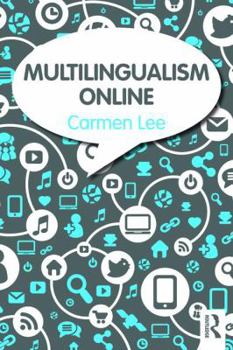Multilingualism Online
Select Format
Select Condition 
Book Overview
By the co-author of Language Online, this book builds on the earlier work while focusing on multilingualism in the digital world. Drawing on a range of digital media - from email to chatrooms and social media such as Facebook, Instagram, and YouTube - Lee demonstrates how online multilingualism is closely linked to people's offline literacy practices and identities, and examines the ways in which people draw on multilingual resources in their internet participation. Bringing together central concepts in sociolinguistics and internet linguistics, the eight chapters cover key issues such as:
language choice
code-switching
identities
language ideologies
minority languages
online translation.
Examples in the book are drawn from both all the major languages and many lesser-written ones such as Chinese dialects, Egyptian Arabic, Irish, and Welsh. A chapter on methodology provides practical information for students and researchers interested in researching online multilingualism from a mixed methods and practice-based approach.
Multilingualism Online
is key reading for all students and researchers in the area of multilingualism and new media, as well as those who want to know more about languages in the digital world.




